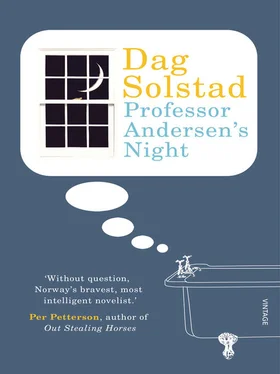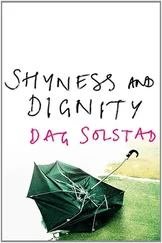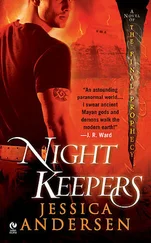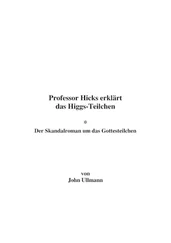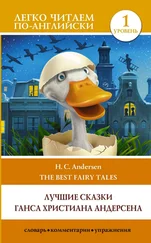Dag Solstad - Professor Andersen's Night
Здесь есть возможность читать онлайн «Dag Solstad - Professor Andersen's Night» весь текст электронной книги совершенно бесплатно (целиком полную версию без сокращений). В некоторых случаях можно слушать аудио, скачать через торрент в формате fb2 и присутствует краткое содержание. Год выпуска: 2011, Издательство: Harvill Secker, Жанр: Современная проза, на английском языке. Описание произведения, (предисловие) а так же отзывы посетителей доступны на портале библиотеки ЛибКат.
- Название:Professor Andersen's Night
- Автор:
- Издательство:Harvill Secker
- Жанр:
- Год:2011
- ISBN:нет данных
- Рейтинг книги:3 / 5. Голосов: 1
-
Избранное:Добавить в избранное
- Отзывы:
-
Ваша оценка:
- 60
- 1
- 2
- 3
- 4
- 5
Professor Andersen's Night: краткое содержание, описание и аннотация
Предлагаем к чтению аннотацию, описание, краткое содержание или предисловие (зависит от того, что написал сам автор книги «Professor Andersen's Night»). Если вы не нашли необходимую информацию о книге — напишите в комментариях, мы постараемся отыскать её.
Professor Andersen fails to report the crime. The days pass, and he becomes paralysed by indecision. Desperate for respite, the professor sets off to a local sushi bar, only to find himself face to face with the murderer.
Professor Andersen's Night
Professor Andersen's Night — читать онлайн бесплатно полную книгу (весь текст) целиком
Ниже представлен текст книги, разбитый по страницам. Система сохранения места последней прочитанной страницы, позволяет с удобством читать онлайн бесплатно книгу «Professor Andersen's Night», без необходимости каждый раз заново искать на чём Вы остановились. Поставьте закладку, и сможете в любой момент перейти на страницу, на которой закончили чтение.
Интервал:
Закладка:
Professor Andersen spent the last days of the year in his apartment, alone and indoors, only interrupted by short trips out for newspapers, the mail, food and drink. He kept watch on the window over on the other side. He recognised him now. He even observed him outside as he went out of the main door of the building and along the pavement, before he disappeared round the corner of Drammensveien. Not with a suitcase or other travel bags, fortunately. This was repeated several times. He could be gone for hours, but he always came back. Professor Andersen didn’t put on the light in his own living room, and was extremely careful not to move about in there in the few hours of daylight. But it was from the window here that he observed him, after the lights had been lit in the building on the other side of the street. He spent most of his time in his study, where he put on the light, but very often he stood behind the curtain in the dark living room and looked across at the window in the apartment in the building on the other side of the street, very carefully at that time of day when there was still daylight, motionless, on guard, so as not to arouse suspicion, something he didn’t need to bother about after dark. It was in this fashion he moved around in his own spacious apartment, from the dark living room, through the equally dark dining room, to the bright study, where he then sat down for a while and pretended to read, before he got up and went back through the rooms in the apartment, brooding, self-scrutinising, fully aware of what he was up to, but nonetheless shaken by the incomprehensibility of it.
‘It isn’t my not reporting it that worries me, or is it that after all?’ he asked himself. ‘Even if I can explain it. But why couldn’t I seek Bernt’s advice?’ he thought. ‘Why was I unable to let him, or someone else, in on this? That is the reason for it, that’s what’s behind it. The whole wretched mess, which is so extraordinary. It’s more sinister than I like to think about. Who am I? Who is sitting and standing and walking here, and not knowing where to turn, making certain that a man whom I don’t want to be associated with at all, with any of his misdeeds, doesn’t disappear from sight? If he disappears, I’m free again. But I don’t seem to want to be free again — that means something surely, but what?’ reasoned Professor Andersen.
‘I can’t pretend I’m not doing this absolutely voluntarily,’ he thought. ‘Even if I feel forced to do it. I have tied myself to this misdeed, which I don’t even dare think about, which has taken place in that apartment, after the curtains were drawn. Where is the body? The blood, all the shit, from the woman. The fair-haired woman, whom I think was young. What has that poor devil done in there? To be able to bear what he has done. Alone with the body. The blood (which he must have washed away, along with all the shit). Where is the body? It must be gone now, since the curtains are drawn back and the young man is going out in the evening and doing errands, whatever they amount to.’
‘Life really lasts too long nowadays,’ he thought. ‘In our day and age. There is probably a lot to be said for meting out a man’s life, all things taken into consideration, so it lasts about fifty-five years; then one has lived through the phases of one’s life, without wear and tear. Childhood, youth, maturity, manhood, and then a short final phase. That should be enough, everything after that is an ordeal. If one is fifty-five years old the maturing process has gone so far that one ought to realise things are moving towards a rapid close. Then one would take that into account. That is the natural life cycle, which progress has wiped out, as if it were a germ, and thus made us ridiculously vain, childlike, both in mind and body,’ thought Professor Andersen. ‘We live far too long, both as children, as youths, in the years we mature, and as mature men. And even then our ordeals haven’t started. The slow closing drama, fairly static, a horrible, slow end; the vainer you have been, the longer it lasts, this endless finale, the real face of modernity in the twentieth century. My life, in other words,’ Professor Andersen added.
‘Did I grasp the opportunity?’ he asked himself, suddenly, ‘Was that what I did? When I decided not to report it. It was terrible really, not to report it, that was what I didn’t understand. I was blinded by recklessness, that’s what I was. And am,’ he added. ‘Society exerts a tremendous influence over one. That was what I didn’t understand, despite always having preached it — to my students, for instance. Why have I set myself up against society in this way? What is it I want to see ? In myself? Or in him. He whom I saw murder?
‘I can’t defend it,’ he thought. ‘That’s the heart of the matter. I’m not proud of it, not at all, but I couldn’t have acted otherwise. The thought of informing on him revolts me, even if he is a murderer, that is a fact which I just have to take into account. I understand this, and stand by it. But why couldn’t I tell Bernt about it, or someone else? What was it I feared in that connection? That I don’t understand. Did I fear Bernt’s arguments against it and his condemnation? I don’t think so, for I know the arguments myself and agree with them. No civilisation can accept and defend the notion that someone who witnesses a murder could fail to bring it to the attention of society. It is surely the primordial crime. Even a father is duty-bound to report his son, and he does so, and if he doesn’t, he suffers greater torment than I do now. I know all of this and am unable to disagree with it, but at the same time: I am also unable to report him. Not then and not now, either. Am I suffering from a boundless feeling of sympathy? In other words, compassion beyond all bounds? Am I suffering along with the murderer, and do I wish to continue to do so? But what about the murder victim? She is dead! Subjected to the primordial crime, but she is dead. The murderer is alive and must continue to be so. Along with me. Beyond all control, in secret. The murderer and his silent witness. The murderer who doesn’t know about his silent witness, but is watched by him and observed. When shall we meet? What on earth is this? Why don’t I want him to disappear from my life? Why do I fear that he’ll disappear from my life?’
Agitated, Professor Andersen wandered around his apartment and brooded over thoughts which didn’t give him a moment’s peace. No matter how much he brooded, he found no answers to his questions. He felt harassed and irritable over trivial irregularities in his routine, such as not being able to find the cheese slice, which he thought he had placed there, in the kitchen drawer, but which he found on top of the fridge, something which unleashed great irritation, directed at himself, because he lived alone and didn’t have anyone else to blame when he couldn’t find his cheese slice. It was New Year’s Eve. The light was on in the window of the apartment opposite. Professor Andersen had purchased food and drink for a New Year’s Eve alone in his own apartment. Fillet steak. Horse. A good red wine. Italian, a Barolo. At any rate, he would treat himself to a good meal, while he kept an eye on the man in the apartment in the building over on the other side of the street. He had also decided to read the latest Shakespeare translation by the poet Edvard Hoem, chiefly to see what misunderstandings were to be found in the translation or adaptation. He thought he learnt a great deal by studying the misunderstandings which were liable to arise when the English spoken by mysterious beings living in the Renaissance period was translated into Norwegian, a stubborn minority language in the twentieth century. ‘Hmm, hmm,’ he thought, with a sudden burst of good humour and anticipation. But then the light was turned off in the apartment. In that one over on the other side of the street. He saw it from his study, from where he had a sideways view. He went quickly into the dark living room and stationed himself behind the curtain. A little later he saw the man coming out of the main entrance, dressed up for a party in thin, black shoes and a thick overcoat with a white scarf slung nonchalantly around his neck. He saw him walk up to a waiting taxi and get in. The sight almost annoyed Professor Andersen. He felt a little offended. Here he was, forced to spend New Year’s Eve all alone in a darkened living room, and then he , the other, goes out to amuse himself. ‘But he won’t amuse himself,’ thought Professor Andersen. ‘After all, he can’t do that any longer. It’s impossible for him, poor man. It’s just a game he has to go through with because life has to go on as before, as though nothing has happened.’
Читать дальшеИнтервал:
Закладка:
Похожие книги на «Professor Andersen's Night»
Представляем Вашему вниманию похожие книги на «Professor Andersen's Night» списком для выбора. Мы отобрали схожую по названию и смыслу литературу в надежде предоставить читателям больше вариантов отыскать новые, интересные, ещё непрочитанные произведения.
Обсуждение, отзывы о книге «Professor Andersen's Night» и просто собственные мнения читателей. Оставьте ваши комментарии, напишите, что Вы думаете о произведении, его смысле или главных героях. Укажите что конкретно понравилось, а что нет, и почему Вы так считаете.
